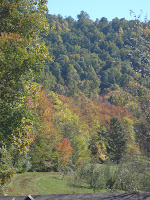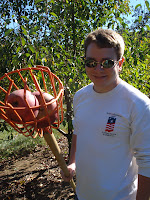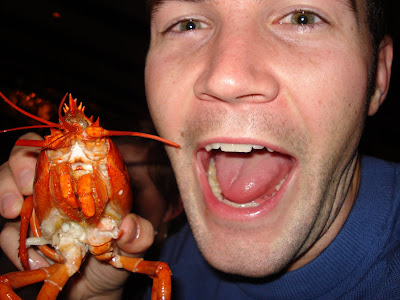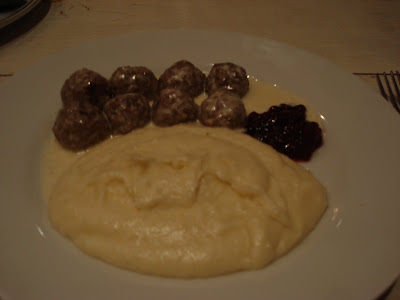
I grew up in a place without seasons. In Northern California, you knew it was winter when it rained for a month straight. The rest of the year, it was always a dreamy 75 degrees, sunny, with no humidity. It sounds nice, but it's actually hard to mark time when there are no seasons. Leaves don't change colors in fall, snow doesn't close the schools in winter, and when spring rolls around, you just notice a bit less rain. Most foods never go out of season. California is where those avocados and asparagus you see in the supermarket come from in the first place. It is a perpetual spring time there.

Here in DC, if you're paying attention, you can mark time by the foods that come and go from the
market. In the spring, the Boyfriend and I ventured out to Delaplane to celebrate the joy of
strawberries, and came home to make the freshest strawberry ice cream I've ever had, warmed in the field that morning, in my dessert bowl the next night. In the fall, it's apple and squash time, as we ventured out once more to rural Virginia to the fields that grow our food.
This time, we found ourselves at
Stribling Orchard in Markham, Virginia. About 60 miles due west of the District, we set off before noon and drove about an hour and a half. Upon arrival, they hand you a brown paper bag and a long wooden clawed apple picker and point you towards the orchards.

Acres of long rows of apple trees, some hanging with little red orbs, some already asleep for the winter, were ours for the picking. I stuck to the lower branches, reaching up on my tippy toes to capture a ripe apple. The Boyfriend demonstrated his hunting and gathering prowess by

wielding the apple picker, refining his technique until he was able to capture four or five fat apples at a time from the highest branches.
As we wandered through the orchard, sliding on fallen apples and getting poked by the occasional stray branch, I overheard a brassy matriarch telling her brood not to bring her back any bruised or damaged apples. "I'm not paying for damaged fruit," she kept repeating. I smiled to myself. Nearly every apple was imperfect in some way -- bruised or scarred or wormy. These are late season apples, the fighters of the family, and they have seen some things and have the scars to prove it. I knew I was just going to can mine as apple sauce and pie filling, so I had no problems with their beauty marks, but these aren't grocery store apples.

They don't look uniform, but they are sweet and firm and natural. I can tolerate a bruised fruit here and there.
Eventually, I had to call the Boyfriend off before we could no longer carry our treasure back to the weighing station. We hoisted our heavy brown sacks to our hips, and walked back through the orchard to the country store where they weighed your apples and took your money. At $1.09 a pound, we had picked $40 of apples -- yup, we are now the proud owners of 35 pounds of staymons. Already last night I got out the mason jars and made quick work of seven or so pounds into a spicy, chunky apple sauce.
Before leaving, we made one last tour of the store, through the shelves of sweet vidalia BBQ sauce, peach butter, apple jelly and blueberry preserves. Apple cakes and turnovers scented the air deeply with cinnamon, our mouths watering. We bought a pumpkin for dinner that night, and a half gallon of fresh cider and called it a day. The car was heavy with the fruits of fall as we drove east, back to DC.












 The heavy meatballs get a nice pick me up from the sweet jam, and the mashed potatoes are smooth and rich, heavy on cream and butter and quite filling on this warm autumn day. (Can we have a word about the weather please? I want it to get chilly. I want leaves to change. It is nearly November, and what is going on?).
The heavy meatballs get a nice pick me up from the sweet jam, and the mashed potatoes are smooth and rich, heavy on cream and butter and quite filling on this warm autumn day. (Can we have a word about the weather please? I want it to get chilly. I want leaves to change. It is nearly November, and what is going on?).


 That purple one is Harry Potter and the Half Blood Prince. While they are adorable and all, I was concerned about the books that were stripped naked for the making of crafts. When I asked Caitlin what she did with the multitude of naked books running around coverless, she assured me that she donates some of them to other local artists for their art projects (is there a paper mache sculpture of an octopus that originated as Harry Potter VI somewhere in the world?). But mostly, she told me, she just has a lot of coverless books on the shelves of her apartment. You can still read them just fine, she reminds me.
That purple one is Harry Potter and the Half Blood Prince. While they are adorable and all, I was concerned about the books that were stripped naked for the making of crafts. When I asked Caitlin what she did with the multitude of naked books running around coverless, she assured me that she donates some of them to other local artists for their art projects (is there a paper mache sculpture of an octopus that originated as Harry Potter VI somewhere in the world?). But mostly, she told me, she just has a lot of coverless books on the shelves of her apartment. You can still read them just fine, she reminds me.


